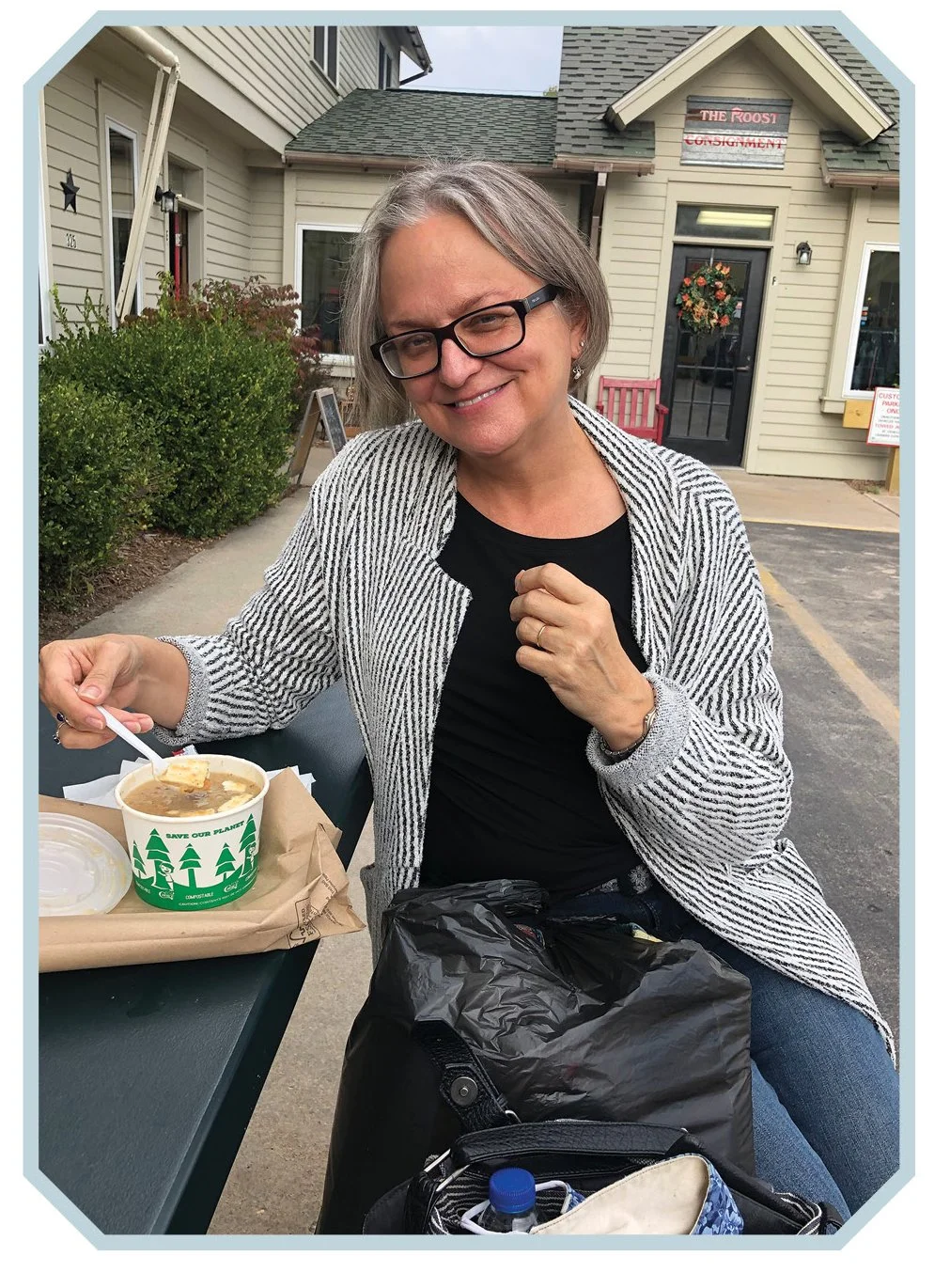By Julie Barrie
I recently spoke with a cousin of mine who mentioned that it was the anniversary of the death of her mother. I let her know that I, too, felt the heaviness of loss even years later. I told her how I was surprised that the world kept moving even when the pain of loss was so crushing, and it seems like everything should just stop. It doesn’t seem right that the world, time, and life doesn’t conform to our need to pause.
My sister’s death continues to be one of those events my life that frustrates me. I’ll never have the answers that I need to “move on” or “accept” the massive cave of despair her absence has created. It has, however, made me realize that despite the pain of not having her in my life, I have a responsibility and a need to be present for the people that I love, and I will continue to strive to be the best possible wife, mother, daughter, sister, friend, and therapist that I can be. My conversation with my cousin reminded me of the important and incredibly impactful moment I had with a client shortly after my sister’s death.
My training as a social worker included clinical supervision, much of which was focused on aspects of providing ethical and competent care. Supervisors frequently cautioned us about not revealing too much personal information to clients. They would say things like, “Make sure that whatever you do share is for their (the client’s) benefit – not just because you want to talk about yourself.” This is a common theme in mental health training, supervision, and practice literature. This concept is clarified by Dr. Barbara LoFrisco, a Tampa, Florida–based licensed mental health counselor, licensed marriage and family therapist (LMFT) and a certified sex therapist (CST). In her blog post from November 2012, she confirmed this approach. She posted, “Self-disclosure in therapy is when a therapist shares their own personal views and experiences with a client with the purpose of improving the client’s emotional or mental state. It should be done solely for the purpose of helping the client, and not to meet the needs of the therapist. I never expected to struggle so much with this concept as I did shortly after I started my own therapy practice.
At this time, I only had about four clients. I saw those clients weekly and was continuing to hold clinical hours at a non-profit agency. Thursdays were my busy clinic nights. I can remember packing up my belongings and locking up the office. On these later-in-the-day appointments I always looked forward to seeing my husband, having dinner, and saying good-night to my children. What I never expected was a frantic phone call from my nephew. I couldn’t understand much of what he was saying, but I knew he was crying and extremely upset. This wasn’t good. What I could make out was that my sister had collapsed, and she was being taken to the hospital. I assured him that his mom would be okay. I’m not really sure why I felt so strongly that I needed to tell him that, but for some reason I intuitively felt the need to reassure him. Perhaps because I needed to think that she was going to be okay myself. All I know is that it came naturally to say it, even though I knew in my heart that it might not be true. I had to be positive. I had to hold hope. I had to be strong.
My sister and I were born 13 months apart. Being the older sister, I always felt that I needed to be there for her. Truth be told, we were always there for each other. She encouraged me despite her own personal struggles. She told me how much she believed in me when I doubted myself. She was a cheerleader in my life and someone that consistently tried to not let me down. Unfortunately, like many of us, she suffered from the burden of depression. I wish that I could have helped her more with that part of her life. Her difficulty helped to inspire and lead me toward the field of mental health. I may not have said it enough to her while I had the chance, but my sister was profoundly impactful in my life. I miss her every day. Her personal struggles had a ripple effect in her immediate family. Her depression symptomology pushed her family members away, and this caused pain beyond measure to her sons and her ex-husband. In addition to her mental health struggles, she frequently dealt with medical issues. The evening she died is still a mystery. Despite an autopsy, the circumstances of her death remain unclear.
After ending that phone call from my nephew, panic set in. My husband and I jumped in the car and drove directly to the hospital where she was taken. It was about a 45-minute drive to the hospital and the drive itself was a blur in my memory. Once arriving, we quickly made our way through the Emergency Department and were taken to her room. My nephews were there, and several other relatives. There was complete quiet except for the crying. She could not be revived. It didn’t feel real. My fifty-year-old sister collapsed in her own home for no apparent reason. If my nephew hadn’t been home and heard the noise created by her fall, she might not have been found until the next day.
I had a hard time seeing her face. Much of her face was obscured by tubes and hoses the medics had inserted while they tried revived her. I remember touching her foot. One of my nephews was near her face, crying, and I remember putting my hands on his shoulders at one point.
The night my sister died, I made four phone calls to my four private practice clients whom I was scheduled to see the very next day. I was completely unpracticed in this procedure. There was no staff to help me with this task. I don’t remember exactly what I told them, and I think that for at least one of them I was only able to leave a voice message. If I can assume what I would have said, most likely it was that I had a family emergency and I would need to cancel their next therapy session, and I would contact them when I knew more about my availability to reschedule. I knew I had left things very open ended. I had no idea what I was doing, when I’d be back in the office, or what the future held for me. All I could think of was my sister and wanting to be there for her children.
One of my clients had just started therapy with me and was struggling with loss and feelings of abandonment and betrayal—not a great mix for an emergency situation like this. I knew that she was not new to being in therapy, but I also knew that she wasn’t quite sure about me. We were in that very early part of the therapeutic relationship that was fragile and not established enough to withstand too much stress. Without even knowing her complete history, I knew that cancelling on her was possibly going to cause a rift in our relationship. I couldn’t imagine having a therapist who cancels the night before a therapy session and doesn’t offer any explanation. I was still establishing trust with this young woman, but cancelling the session was unavoidable.
Early in my training, I was told that the therapist is supposed to be a “blank screen.” I was also taught that when trying to establish trust in the therapeutic relationship I needed to be “real.” It was pretty tough to be a blank screen and real at the same time. I was a mess. I felt like there was a hole inside of me that would never be healed. I had no idea when I might feel I could go back to my work. I couldn’t imagine being able to focus and to give someone my undivided attention without getting lost in my own sadness. About a week after the funeral, I contacted my private practice clients and picked a date on the calendar to force myself back in the saddle. I decided that after four weeks I could get back to work. I got them all rescheduled for their next therapy session. It was surprising to me that none of them refused to reschedule and all agreed to set up an appointment. On the first day back to my office I was given a great gift, as well as shocking realization.
Heading back to my office felt a little surreal. How could I really expect that I could focus and listen and be at all helpful? I wasn’t crying constantly, but tears were never very far from the surface and it didn’t take much for me to get lost in my own thoughts. In my heart of hearts, I really wanted to take more time to be home, to tend to my own needs, and hide from responsibilities outside of my nephews and my own kids. I was very glad that my office partner had taken care of collecting the mail and watering the plants that surely would have disintegrated into dust by my absence. I was relieved on the first day back to realize that being there to give my full attention to someone else was actually a relief. It helped me not think about my own loss, even if it was just a few hours each day.
When I first returned to work, my experience with each client was different.
Most of them saw that I was okay, or at least presenting as such, and none of them asked much about why I had been gone. Then when the young woman who was new to my practice came in– the one who had just begun establishing a connection with me—she started the session by asking me if I was okay. She had a bit of an air about her, as though she was waiting for me to tell her that I had taken off four weeks to go to the beach or something. Her chin was slightly raised, and her eyes projected a wall, a barrier almost, daring me to ask her what was wrong. I remained quiet, and she asked me if I was willing to explain why I had cancelled our session and not rescheduled for all these weeks. I told her that I was really sad and that there had been a death in my family, but that I was ready to focus now and be there for her. That previous air of indignation collapsed in front of me. I could see the wall her eyes had built crumble away. My brief share tore down her defenses and immediately solidified an understanding between the two of us. Tears immediately fell from her eyes, and she softened. After a moment, and quite a lot of tears, she told me about how incredibly angry she felt when I cancelled our last appointment, so much so that she was only coming in to yell at me and tell me what a terrible therapist I was. Moreover, she was planning to fire me. She blew her nose and thanked me for sharing the reason I had cancelled our appointment. She told me what she grieved in her life, and her experiences with abandonment, and the betrayals she suffered when she had trusted people. Our therapeutic alliance started that day. She never knew about the pain that I felt losing my sister. I didn’t share my continued burden of loss or my bottomless chasm of grief. However, she started to trust me in part because I told her that I had to cancel our session because I was attending to a death. I’m pretty sure that I wasn’t exactly a blank screen, but I was definitely real.
Julie Barrie has been a therapist in Ann Arbor since 2006 and began her private practice therapy office in 2013. She lives in Ann Arbor with her husband of over 40 years. Luckily, all of their four children live in the area. Their family is growing as their adult children choose partners, and with the arrival of grandchildren.
Barrie holds an MSW degree from Wayne State University and a Sexual Health Certificate from U-Michigan. Her office is located at 5340 Plymouth Rd Suite 104 Ann Arbor, MI 48105 . Get in touch by emailing her at juliasdesigns@comcast.net or call (734) 945-8143.






































































































































































































My sister’s death continues to be one of those events my life that frustrates me. I’ll never have the answers that I need to “move on” or “accept” the massive cave of despair her absence has created. It has, however, made me realize that despite the pain of not having her in my life, I have a responsibility and a need to be present for the people that I love, and I will continue to strive to be the best possible wife, mother, daughter, sister, friend, and therapist that I can be. My conversation with my cousin reminded me of the important and incredibly impactful moment I had with a client shortly after my sister’s death.